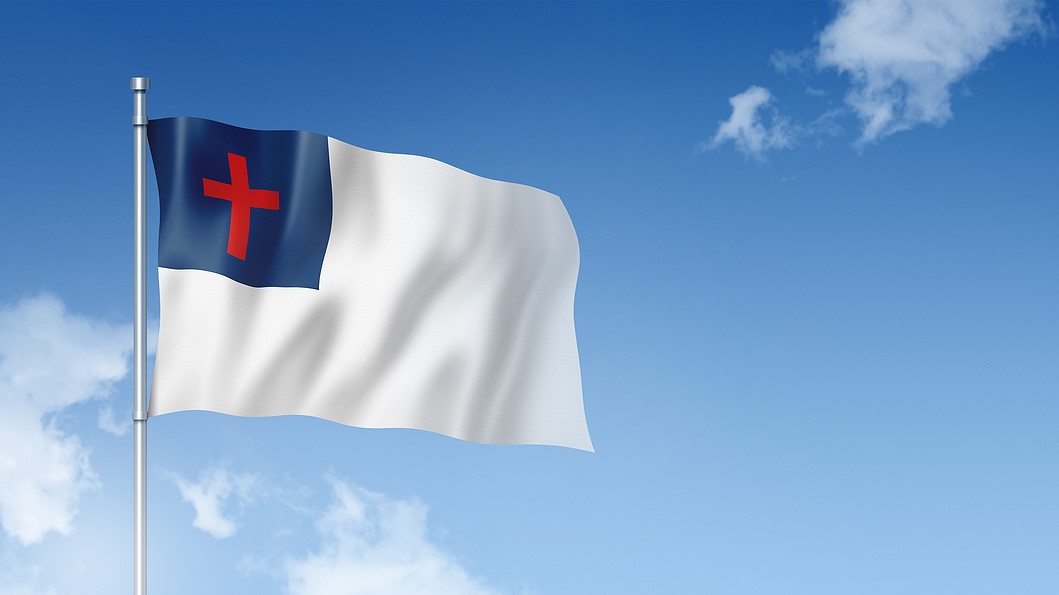WASHINGTON (BP)—The Southern Baptist Convention’s (SBC) religious freedom entity welcomed the U.S. Supreme Court’s unanimous ruling, May 2, that the city of Boston violated the constitutionally protected right to free speech by prohibiting the flying of the Christian flag.
In a 9-0 judgment that united the conservative and liberal wings of the high court, the justices found in Shurtleff v. City of Boston the city’s refusal to permit a Christian civic organization to raise the Christian flag—though it allowed other private groups to fly their flags—transgressed the First Amendment.
The Southern Baptist Ethics & Religious Liberty Commission (ERLC) had joined the Congressional Prayer Caucus Foundation and eight other organizations in a friend-of-the-court brief in support of Camp Constitution. The ERLC-endorsed brief contended Boston’s policy violated the First Amendment’s protections of both free speech and free exercise of religion.
The Supreme Court “resoundingly shot down the city of Boston’s incompetent attempt to abridge the free-speech rights of an individual and his organization for communicating a ‘religious viewpoint,’” said Brent Leatherwood, the ERLC’s acting president. “The opinion of the court lines up with many of the themes of the brief joined by the ERLC in this case. We view this decision as a welcome addition to our nation’s First Amendment jurisprudence.
“The reality is, had Boston continued with its established track record of approving every request that came in, this issue never would have been adjudicated,” Leatherwood told Baptist Press in written comments. “Given the united admonition of Boston’s unconstitutional actions, I’m sure the city now wishes it had simply granted Mr. Shurtleff’s request in the first place.”
The plaza outside the entrance to Boston’s City Hall includes three flagpoles, one for the American flag, one for the Massachusetts flag and one for either the city flag or that of a country or private group. From 2005 to 2017, the city approved the raising on the third pole of about 50 different flags in more than 280 ceremonies. Each of these flags – which included one celebrating Pride Week and one honoring emergency medical service workers – was flown during a ceremony on the plaza that normally lasted about two hours.
Hal Shurtleff, director of Camp Constitution, applied in 2017 to hold a flag-raising ceremony on Constitution Day and Citizenship Day (Sept. 17) at City Hall to celebrate the public contributions of the Christian community. Apparently for the first time, the city declined such an application. A Boston official said the organization could not raise the Christian flag as part of the ceremony.
When Shurtleff and Camp Constitution sued Boston, a federal court ruled in favor of the city, saying the flying of flags by private groups on the third pole was government speech. Therefore, the city could refuse to permit the flying of the Christian flag. The First Circuit Court of Appeals in Boston upheld the lower court’s opinion.
The city’s flag-raising practice is not government speech, Associate Justice Stephen Breyer said, however, in writing the court’s opinion. Boston’s previous “lack of meaningful involvement in the selection of flags or the crafting of their messages leads us to classify the flag raisings as private, not government, speech,” he wrote in the 13-page opinion.
Boston feared permitting the Christian flag to fly at City Hall might violate the First Amendment’s ban on government establishment of religion, Breyer wrote. Because the high court found the city’s flag-raising practice is not government speech, when “a government does not speak for itself, it may not exclude speech based on ‘religious viewpoint,’” he said.
“Under our precedents, and in view of our government-speech holding here, that refusal discriminated based on religious viewpoint and violated the Free Speech Clause,” Breyer wrote.
Liberty Counsel Chairman Mat Staver, who represented Shurtleff in the January oral arguments before the high court, said Monday the unanimous decision “strikes a victory for private speech in a public forum. Boston openly discriminated against viewpoints it disfavored when it opened the flagpoles to all applicants and then excluded Christian viewpoints.”
Chief Justice John Roberts and Associate Justices Sonia Sotomayor, Elena Kagan, Brett Kavanaugh and Amy Coney Barrett joined Breyer in his opinion. Associate Justices Samuel Alito and Neil Gorsuch wrote concurring opinions that agreed with the court’s judgment. Associate Justice Clarence Thomas joined both of those concurring opinions, and Gorsuch signed onto Alito’s concurrence.
In his concurring opinion, Gorsuch pinned at least part of the blame for Boston’s misguided rejection of Shurtleff’s application on the high court and its half-century-old Lemon test. That standard presented in the 1971 Lemon v. Kurtzman opinion said a law must have a secular purpose, not primarily promote or restrict religion and “not foster an excessive entanglement with religion” to avoid a violation of the First Amendment’s Establishment Clause.
Gorsuch had said during April 25 oral arguments in a case involving a high school football coach’s post-game prayer on the field the Supreme Court had not applied the oft-criticized Lemon test in church-state cases for the last 20 to 30 years. The high court, however, has never explicitly rejected Lemon.
The Lemon test “bypassed any inquiry into the (Establishment) Clause’s original meaning” and “ignored any longstanding precedents,” he wrote in his concurring opinion. “And instead of bringing clarity to the area, Lemon produced only chaos.”
While the Supreme Court eventually “abandoned Lemon,” Boston “chose to follow Lemon anyway” in this case, Gorsuch said. “It proved a costly decision, and Boston’s travails supply a cautionary tale for other localities and lower courts.”
Joining the ERLC on the brief filed by the Congressional Prayer Caucus Foundation were the National Association of Evangelicals, Christian Legal Society, National Legal Foundation, Concerned Women for America, Pacific Justice Institute, International Conference of Evangelical Chaplain Endorsers, Family Foundation and Illinois Family Institute.




